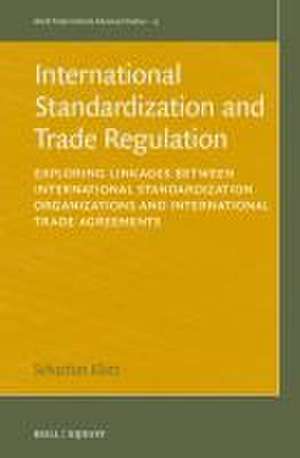International Standardization and Trade Regulation: Exploring Linkages between International Standardization Organizations and International Trade Agreements: World Trade Institute Advanced Studies, cartea 15
Autor Sebastian Klotzen Limba Engleză Hardback – 9 ian 2024
As tariffs have fallen dramatically over the past decades, behind-the-border measures—such as technical barriers to trade (TBT) and sanitary and phytosanitary (SPS) measures—have become increasingly important for international trade policy. To facilitate trade, governments sign trade agreements in which they agree to base such measures on international standards. But who actually develops these standards? This book takes a close look at the International Organization for Standardization and the Codex Alimentarius – two prominent standard-setting organizations in the area of TBT and SPS – to investigate how international standardization influences the design of international trade agreements, and vice versa.
Preț: 636.55 lei
Preț vechi: 776.29 lei
-18% Nou
Puncte Express: 955
Preț estimativ în valută:
121.80€ • 132.72$ • 102.64£
121.80€ • 132.72$ • 102.64£
Carte indisponibilă temporar
Doresc să fiu notificat când acest titlu va fi disponibil:
Se trimite...
Preluare comenzi: 021 569.72.76
Specificații
ISBN-13: 9789004691834
ISBN-10: 9004691839
Dimensiuni: 155 x 235 mm
Greutate: 0.54 kg
Editura: Brill
Colecția Brill | Nijhoff
Seria World Trade Institute Advanced Studies
ISBN-10: 9004691839
Dimensiuni: 155 x 235 mm
Greutate: 0.54 kg
Editura: Brill
Colecția Brill | Nijhoff
Seria World Trade Institute Advanced Studies
Notă biografică
Sebastian Klotz completed his doctorate at the World Trade Institute, University of Bern. His research focuses on the political economy of international trade and international standardization.
Cuprins
Acknowledgements
List of Figures
List of Tables
Abbreviations
1 Introduction
2 Concepts and Debates
2.1 Clarification of Concepts
2.2 Review of Global Governance Debates
2.3 Multilateral Trade Agreements and International Standardization
2.4 International Standardization and Preferential Trade Agreements
2.5 Interim Conclusion
3 International Standardization Organizations
3.1 The Codex Alimentarius
3.2 The International Organization for Standardization
3.3 Interim Conclusion
3.4 Appendices
4 Multilateral Trade Agreements and International Standardization
4.1 Introduction
4.2 Literature and Research Gap
4.3 Hypotheses
4.4 Data and Methodology
4.5 Empirical Analysis
4.6 Interim Conclusion
4.7 Appendices
5 International Standardization and Preferential Trade Agreements
5.1 Introduction
5.2 Literature and Research Gap
5.3 Hypotheses
5.4 Data and Methodology
5.5 Empirical Analysis
5.6 Interim Conclusion
5.7 Appendices
6 Conclusion and Future Research
Bibliography
Index
List of Figures
List of Tables
Abbreviations
1 Introduction
2 Concepts and Debates
2.1 Clarification of Concepts
2.2 Review of Global Governance Debates
2.3 Multilateral Trade Agreements and International Standardization
2.4 International Standardization and Preferential Trade Agreements
2.5 Interim Conclusion
3 International Standardization Organizations
3.1 The Codex Alimentarius
3.2 The International Organization for Standardization
3.3 Interim Conclusion
3.4 Appendices
4 Multilateral Trade Agreements and International Standardization
4.1 Introduction
4.2 Literature and Research Gap
4.3 Hypotheses
4.4 Data and Methodology
4.5 Empirical Analysis
4.6 Interim Conclusion
4.7 Appendices
5 International Standardization and Preferential Trade Agreements
5.1 Introduction
5.2 Literature and Research Gap
5.3 Hypotheses
5.4 Data and Methodology
5.5 Empirical Analysis
5.6 Interim Conclusion
5.7 Appendices
6 Conclusion and Future Research
Bibliography
Index













